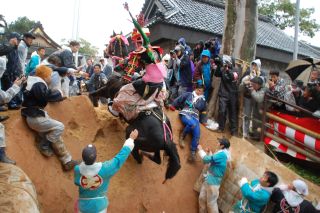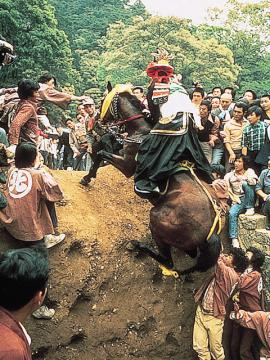Westerners who know little or nothing of Shinto like to think it’s a ‘green’ religion. Yet strangely the voice of Shinto is completely absent from anti-nuclear demonstrations, from protests against the dolphin massacre at Taiji, and from any kind of objection to whaling. In fact, the Shinto establishment is very much aligned with the Abe government in supporting all three of the anti-environmental measures.
If Shinto was truly concerned with environmental matters, it would certainly not be practising animal cruelty. Yet that is exactly what it’s doing at the annual Tado Festival in Mie Prefecture. The sickening Age-uma festival has featured on Green Shinto twice before (see here for details), and the authorities have even been taken to court to stop the barbaric practices. Yet animal welfare monitors report that this year’s festival continues to show absolutely no improvements at all.
Ironically, the horse is a sacred animal in Shinto, as it is regarded as the mount of the kami. A few special shrines keep a white horse on the grounds, and ‘horse pictures’ are the origin of the votive plaques known as ema. Yet despite this, Shinto shrines apparently see no problem with maltreating horses, leading sometimes to severe and crippling injuries. It’s a matter of ‘tradition’.
Here is the report of the Japan Animal Welfare Society for this year’s festival (Newsletter 83, Spring 2015, p.9). The emphasis is theirs…
Age-Uma still runningJCAW representatives visited the Age-uma Shinji again this year to observe and report on the cruel practices. This festival, held in Inabe and Tado Shinto Shrine, uses horses in a shockingly abusive way, where they are ridden at high speed and encouraged to jump a high, vertical stone wall.Unfortunately, the abusive actions of festival staff have continued despite numerous warnings issued by JCAW (Japan Coalition for Animal Welfare), including a request for action officially filed with the local police department.JCAW will continue to monitor this festival and devise new ways in which to change the current situation.This festival uses horses in a shockingly abusive way, where they are ridden at high speed and encouraged to jump a high, vertical stone wall.


I hope I am alive to see the day when the collective consciousness of humanity fully grasps the depravity of our treatment of animals. Thank you for this interesting piece of information. Reminds me of my Japanese friend explaining to me how Shinto is looked down upon by some Japanese as colluding with the authority and is essentially too uncool to be taken seriously! Such a shame.
Yes, I fervently hope too Jude that the current treatment of animals, particularly in factory farming, will one day be seen as the moral equivalent of concentration camps…
As a practitioner of Shinto, I still find myself sometimes at odds with the traditions and viewpoints made in the name of Shinto. An Amish saying: “Good wood splits,” meaning that differing viewpoints create growth.
With that in mind, I don’t agree with Shinto’s support of Abe’s militarism, and there are some traditions that need to evolve into something more compassionate.
Thank you, Charuko… With more practitioners like yourself, there’s always hope that Shinto as a whole will one day evolve to espouse more universal and green policies.
Greetings! I was quite appalled to read this. I agree with all the replies above. Altho I am not a “confirmed”[!] Shintoist, much of Shinto has a strong resonance within me and like Charuko I find myself with quite a sense of disquiet.
Maybe western Shinto however that might evolve, but slowly evolving it is, will free westerners from some of the more repellent aspects of “traditions” as they, and others, strive to practice and follow the original values of shinto of reverence for nature?
graham in canberra australia
Whaling, seriously ?
Japanese have eaten whale meat since immemorial times. Whales eat a lot of fish. Really a lot of it. They are a fat ass species, see ? The problem is whales do not restrict themselves, and they have almost no predators. Only the humans. Only Japan.
When US citizens came to disturb Japan for the first time, they were there just so Japan would be there port to do whaling. US didn’t eat whale meat, they only wanted the OIL ! Already oil obsessed country, even before petroleum, attacking other countries for oil.
Why is it the International Community want Japan to stop whale hunting ?
Japan produce barely any food, less than 50% of the food it needs. They don’t want Japanese to eat whale meat because that will reduce, again, Japanese food autonomy, and open the market for Anglo-saxons produced GMO food.
Money. Not compassion toward living intelligent being. That is the real reason.
Besides, the Japanese Government specifically take care of whale hunting only species who are not endangered. And they are clearly not, because if they were, hunger would not make them die on human shores. Wait, hunger ? Oh, right… there is less and less food in our dying seas.
Remind me whose countries are polluting the most already ? Those who protest against Whale Hunting, and those who are dominated by the WASP mainstream medias.
Just stop every human sky-polluting activity for a month. Just 1 MONTH ! And the skies will be pure and clear enough to see the stars as if we were in the desert or some high mountains.
Why are we not doing so ? Because most modern human societies are just too obsessed with money, because they are following the rules set up by European and WASP countries. Like Iran, China or India, they are just using sophistry when they claim having the right to do the same even if it destroy our environment.
I’m afraid I have to say that tradition is the most idiotic justification for continuing an obsolete practice. Would you justify slavery because it used to be a tradition in Japan? Would you justify the practice of human sacrifice (hitobashira)? Would you justify crucifixion and torture, as Japanese once used against Christians? Before making such an argument, it would be helpful if you thought through the consequences.
A second point is that the killing of whales is extremely cruel and painful. It can take more than twenty minutes after harpooning for a whale to die, with great distress to family members with which it’s in communication. Indifference to such suffering should not be part of a Shinto standpoint, nor would it have been in the past when Buddhism injected compassion to other sentient beings as one of its prime values. The nationalist tendency underlying the justification of whaling is precisely why the abolition of syncretism by the Meiji government could be seen as a tragic mistake.
Green Shinto stands for harmony with nature and a caring attitude to the environment. It also stands for universalism and goodwill between cultures. It has no time for rapacious and narrow-minded chauvinism.
Hello John.
I have a group on FB called Lafcadian Universalism, if interested.
That’s Universalism based on the thinking of Lafcadio Hearn? It’s an interesting idea in terms of the scientific thinking he drew from Herbert Spencer, though Hearn’s writing about Japan suggests anything but universalism…
All life is sacred, and should be respected, humans should be protectors not destroyers of all creatures that share our planet, without these creatures we will not survive, Otis in the interests of all to preserve, the wonderful gifts around us ….